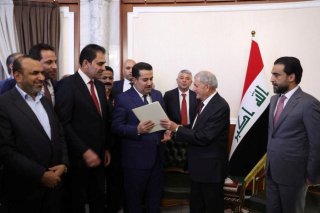The Good, the Bad, and the Ugly in Iraq’s New Cabinet
It remains to be seen whether the Iraqi honeymoon continues.
A year after holding its parliamentary election and two months after a quick round of civil war, Iraq finally got a new cabinet that is—like everything else in Iraqi politics—full of surprises. Despite the dominance of the pro-Iran blocs, the new cabinet also has patriotic and law-abiding ministers with whom America can work to continue building the Iraqi state’s capacity and developing its nascent democracy.
The 2021 election resulted in a rout for pro-Iran lawmakers and a sweeping victory for anti-militia Shia cleric Moqtada Sadr. But Sadr’s amateurism prompted him to instruct his bloc, then the biggest, to resign. Iran and former prime minister Nouri al-Maliki jumped at the opportunity and got their losing candidates sworn in as replacements, thus forming the biggest bloc and dictating cabinet formation.
On October 13, Muhammad Shiya al-Sudani got the call to form a cabinet. Iraqi pundits argued that Sudani was chosen because he was a “second-tier” politician who could be bossed around by his pro-Iran parliamentary bloc.
Sudani’s top supporter has been Maliki and his State of Law bloc. Since he was trounced in 2014, Maliki has been obsessed with taking back the premiership. His support of Sudani has thus made many believe that the former premier was looking for a seat warmer until he could stage his comeback.
Sudani’s cabinet lineup, however, suggested that he might not be, after all, in Maliki or Tehran’s pocket, as he has been so far thought to be.
Sudani kept Kurdish Fouad Hussein, a holdover from the previous cabinet, as foreign minister. Defense was given to the Sunni bloc’s Thabit al-Abbasi. Surprisingly, however, Shia general Abdul-Amir al-Shummari was appointed minister of the interior.
The Interior Ministry handles the payroll of the pro-Iran militias, which operate under an umbrella organization known as the Popular Mobilization Units (PMUs), at an annual cost of $2 billion. Shummari, however, is a military career officer who has little appreciation of the ragtag militias. In 2015, he went as far as ordering the storming of the headquarters of Kataeb Hezbollah, Iran’s flagship militia in Iraq.
In his ministerial platform, Sudani promised to make available all the resources possible to develop and empower the national army and federal police, describing the two agencies as “the guarantors of civil peace, national security and law enforcement,” a clear swipe at the pro-Iran militias, which assign to themselves such roles. Sudani did not go as far as promising to disband and disarm the controversial pro-Iran militias, but appointing Shummari and throwing his lot behind government forces might make the PMUs, and Tehran behind them, nervous.
Sudani, however, did offer Iran and its militias a consolation prize. Ahmad al-Asadi, a longtime protégé of Tehran and a former PMU spokesperson and commander of the Jund al-Imam militia, was appointed labor minister. Al-Asadi, who visited the United States in 2015 to rally support for PMUs among Iraqi Americans, has been politically mercurial, often switching positions to serve his personal interests. Whether he will serve as Tehran’s asset inside the Iraqi cabinet remains to be seen.
Another bright spot in the new Iraqi cabinet is its treasurer, Minister of Finance Tayf Sami. First employed at the ministry in 1985, Sami has climbed the ranks and won several epithets, including Iron Woman and “Sit Makou Flous,” Iraqi dialect for “Lady No Money.” Sami has become famous for her honesty, austerity, and standing up to corrupt practices and staff. She has received several threats and—at one time—saw her house surrounded by thugs and militiamen.
But as if to counterbalance Lady No Money, Sudani appointed another woman, Maliki’s ally Hiyam Kazem, as telecom minister.
As a lawmaker since 2010, Sudani has tried to take on the three telecom companies that operate Iraq’s cell phone network, accusing them of corruption. Yet giving the portfolio to an ally of Maliki, who is associated with embezzlement of public funds and other corruption, threatens Sudani’s own anti-corruption pet project.
In his platform, Sudani seems to have overpromised. He offered an ambitious plan of holding early elections in a year, with a new electoral law approved in three months, which is a tall order given Iraq’s messy politics.
Sudani also offered original economic thinking, including plans to wean Iraq off its oil revenue and grow a competitive private sector that can rely on a young and educated population. Over 40 percent of Iraqis are between the ages of ten and twenty-nine.
Buoyed by a bullish oil market and with government revenues averaging $10 billion a month, Iraq has been running surpluses. To switch the economy from oil rent to services, in a year, sounds like a hill that is too steep to climb.
With the Tehran regime busy putting out domestic fires sparked by its abuse of anti-hijab protesters, Iraq got its break. It formed a new cabinet sixteen days before Sudani’s mandate to form a government expired. Parliament gathered without militia rockets raining on and around it.
It remains to be seen, however, whether the Iraqi honeymoon continues and Baghdad benefits from the likes of Shummari and Sami, or if things go south and Maliki’s allies win the day.
Hussain Abdul-Hussain is a research fellow at the Foundation for Defense of Democracies (FDD), a Washington, DC-based, nonpartisan research institute focusing on national security and foreign policy. Follow Hussain on Twitter @hahussain.
Image: Reuters.

